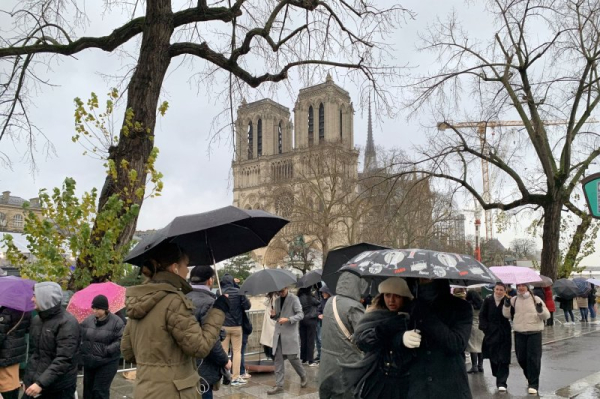
1 of 4 | Visitors look on at Notre-Dame on the re-opening day of the world-famous cathedral in Paris, France, on Sunday, December 8, 2024. The medieval cathedral officially rang its bells again today for the first time in five years after it burned down in a devastating fire. Photo by Maya Vidon-White/UPI | License Photo
Religious leaders and parishioners gathered Sunday for the first time since a fire ravaged Paris’ iconic Notre Dame cathedral five years ago, celebrating the medieval church’s rebirth and marking the consecration of its altar.
Catholic faithful stood outside in the cold and the rain. Advertisement
Inside hundreds of worshipers gathered in the newly rebuilt sanctuary to experience the music from the painstakingly and meticulously cleaned 8,000 pipe organ, bringing Notre Dame’s interior to life after more than half a decade of silence, when a rogue fire destroyed much of the religious and cultural icon.
A new altar and golden cross have been installed, and fire doors and sprinklers have been added as modern additions. The Crown of Thorns, said to be the wreath placed on Jesus Christ’s head during his crucifixion, and one of the cathedral’s most sacred items, will sit in a reliquary. Advertisement
The restoration was completed last week and French President Emmanual Macron took a tour to see the makeover, which includes a total rebuild of the historic and soaring ornamental wooden spire, known as “la fléche,” or arrow in French, which required 500 tons of timber coated with 250 tons of lead.
“It’s going to come back to the Parisian landscape for many years to come,” Patrick Jouenne, the project’s lead carpenter, told the PBS Newshour. Jouenne left his regular job not knowing if he would even be working on the spire but, while not especially religious, said he felt there was something guiding him to the work.
“We had to use exactly the same techniques as before or at least assemble things as closely as possible to make it look 100 percent like what was there before. So I looked back at the documents from 1858 by the carpenter at the time. And, wow, what an honor to touch the papers drawn by the former workers involved in the project. It was really moving.”
Macron set a five-year deadline to rebuild the mammoth and historic cathedral, a huge undertaking for a world- renowned icon, much of which had been reduced to smoking ash by the blaze. It took three quarters of a billion donated dollars to complete the rebuild. Advertisement
In addition to the iconic spire, Notre Dame has been refurbished and reconstructed to be as historically close as possible to the original, which opened in 1163. The effort is in no small part due to the efforts of the chief architect, Philippe Villeneuve.
“When I was young, I used to build my model of Notre Dame out of wood, cardboard, whatever you like,” he said. “And when I closed the vault of the north transept, which was the first vault we closed, well, I felt like I was still 16.
Villeneuve credited not only the tight five-year deadline imposed by Macron, but also generous donors who made paying for the rebuild possible
“And we really have to thank them, because this is the first time we have been able to say that we built a cathedral almost entirely from the inside out,” Villeneuve said.
Beyond the reconstruction of the spire and the expansive and intricate architectural work to restore the icon’s most basic foundation, Notre Dame’s interior was also completely cleaned, returning it to its nearly original condition. It had become nearly unrecognizable over the centuries.
“The masonry in particular was very dark,” archaeologist Dr. Dorothee Chaoui-Derieux said. “It was the dust of centuries that had finally accumulated. Me, in my memory, I really had the image of a very, very dark, very dark cathedral. The stained-glass windows had not been cleaned for a very long time as well. There, we will find a stone that is very, very blond.” Advertisement
“We owe this metamorphosis to you,” Macron told the reconstruction team. “You were the magicians of this construction site and you changed charcoal into art,” the PBS Newshour story reported.